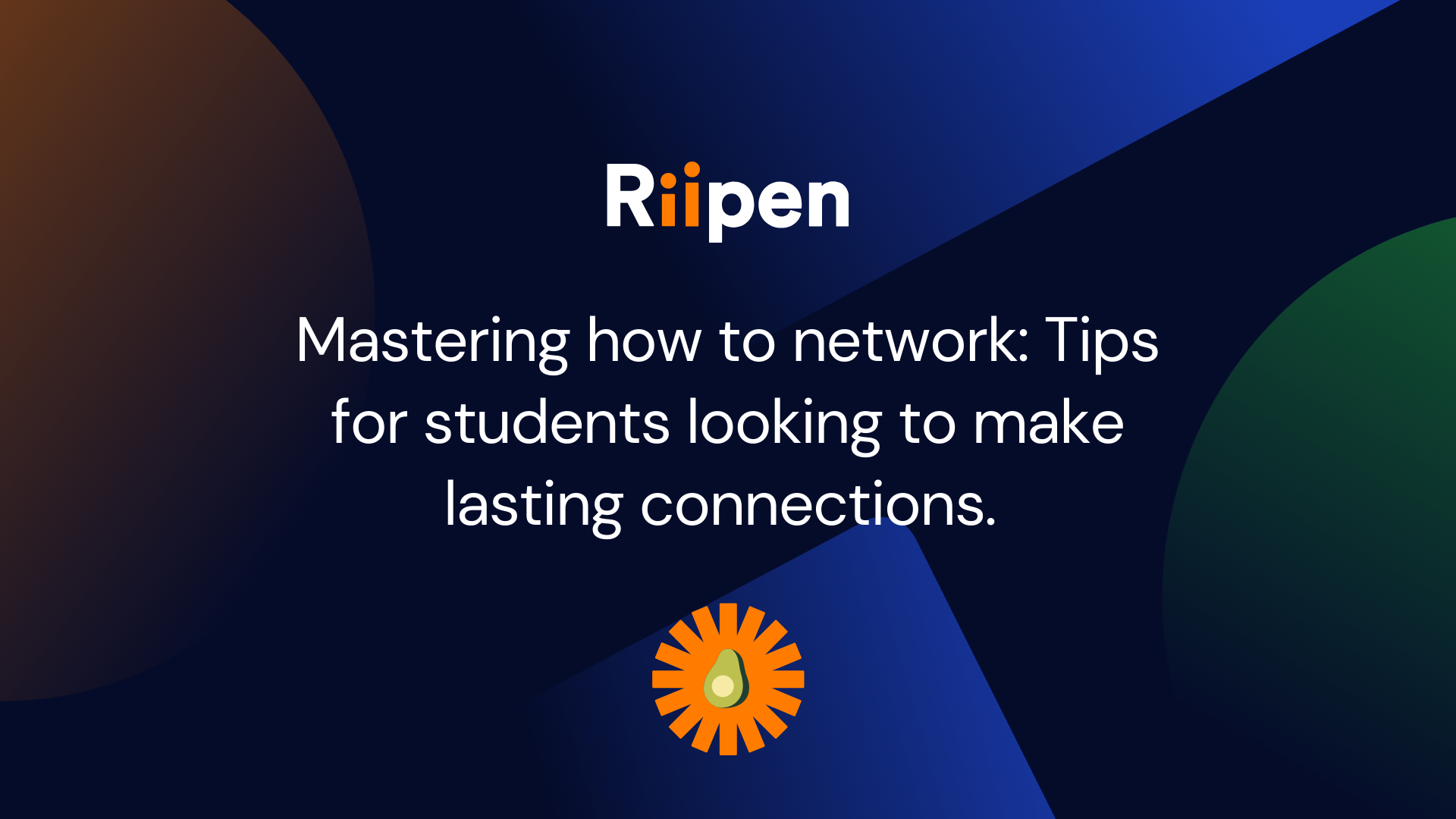Mastering how to network: Tips for students looking to make lasting connections.
Work-based learning helps students gain experience, learn how to network, and find a job. Read this blog for five networking tips.

Whether you're just starting out or have a few years of experience under your belt, networking is one of the most powerful tools to accelerate your career. But here’s the catch: it’s a skill that’s rarely taught in the classroom. So, as a student, how can you master the art of networking and use those connections to help land your dream job?
Riipen can help. For over a decade, we’ve facilitated connections between students and employers for internships and other work-based learning opportunities. Based on our experience, here are five best practices that can help you build lasting relationships with employers you interact with and develop your professional network.
1. Solicit feedback and advice.
Working with employers on real-world projects is a great way to gain experience applying the skills you’ve learned in the classroom. It allows you to discover gaps in your knowledge and skill set so you can continue to learn and grow professionally. By asking your project manager(s) for feedback and advice on your work, they will see that you are serious about your career development and value their opinion.
At Riipen, we make it easier than ever for students to gain valuable real-world experience by working on industry-specific projects. Through our platform, you can collaborate directly with employers on short-term, meaningful projects that align with your field of study. These hands-on opportunities allow you to apply the skills you’ve learned in the classroom while working on projects that make a real impact.
Working with employers on Riipen lets you build your portfolio and receive constructive feedback and advice from professionals in your field. By engaging in these real-world projects, you can identify areas for growth, strengthen your skillset, and demonstrate to employers that you are proactive about your career development. Riipen provides a seamless way to connect and communicate with employers, allowing you to get the experience you need to grow professionally and make valuable networking connections along the way.
2. Ask about your manager’s career path.
If you're new to a job or internship, try to establish a working relationship with your team by asking questions you may have outside your project scope. While it may feel awkward at first to raise questions of a more personal nature, it can go a long way in developing a deeper connection and making a name for yourself that people will remember.
Here are some questions you could ask to get the conversation started:
- Why did you choose this career?
- What do you like most about your job?
- How did you build your professional network?
- What advice would you give someone just starting out?
Hajirah, a student who worked at First Work after matching with them on Riipen, gained valuable advice from his managers. They “let me know about the courses that I could take to add to my resume, and they encouraged me to seek out new skills.” By asking your manager to share their personal journey, you’ll develop a deeper relationship with them that will continue long after your project has ended.
3. Attend networking events.
Attending networking events is a how-to-network 101. These events are one of the most effective ways for students to build valuable connections that can shape their careers. They provide opportunities to meet professionals, industry leaders, and peers who can offer insights, advice, and even potential job leads. Networking in person allows you to make lasting impressions, practice your communication skills, and learn from others in a real-world setting.
Here are some tips and tricks to make the most of these events:
- Be prepared: Prepare an elevator pitch that's a brief, confident introduction about who you are and what you're studying.
- Ask questions: Engage with speakers and attendees by asking thoughtful questions about their careers and experiences.
- Listen more than you speak: Focus on building genuine conversations rather than just talking about yourself.
- Follow up: After the event, reach out to new contacts on LinkedIn or via email to keep the conversation going.
Finding networking events is easier than you might think! Look for industry-specific meetups on platforms like Eventbrite and Meetup, check your university’s career services for events, or follow relevant groups or organizations for announcements.
4. Leverage LinkedIn and other professional platforms.
Social media is a fantastic tool for developing your professional network. If you haven't done so already, the first step is to build your LinkedIn presence and a presence on other professional platforms relevant to your field (TIP: When using Riipen, you can ask your Riipen project manager for suggestions on what other platforms might be beneficial to use in your field).
Keep your profile professional, with a headshot and a list of skills, licenses, and certifications, including those you might receive from completing a program through Riipen.
Extend connection requests to people you've worked with, whether from a work-based learning program through Riipen, a networking event, or an internship—the goal is to connect. This will allow you to engage with them by commenting on their content or publishing a shout-out thanking the employer for the project opportunity.
5. Maximize social opportunities.
A great way to network is to take advantage of the social interactions you have in your day-to-day life. Networking doesn’t always have to be formal or through events; sometimes, the best connections come from casual conversations. Whether it's chatting with someone at your local coffee shop or striking up a conversation with colleagues or team members you wouldn't typically interact with, these opportunities are often more valuable than you might think.
You can gain fresh perspectives on career paths and industry insights by approaching these interactions with an open and curious mindset. Everyone you meet has a different background and experience, and you can learn something new from each conversation. These informal connections can lead to discovering new opportunities, tips, or even mentorship from people eager to help and share their knowledge. Plus, these types of conversations often feel more authentic because they aren’t forced, and they can help you build a diverse network of people who might not be in your immediate professional circle.
So next time you find yourself in a social setting, be proactive, approachable, and ready to learn. The more you put yourself out there, the more personal and professional connections you'll make.
In today’s competitive world of work, learning how to network is essential for career success. By following these best practices, you can develop long-term, valuable connections with employers to help you find a job.
To learn more about how Riipen can help your career development, visit riipen.com/students.

About the author:
Carol Chin is a communications consultant specializing in content creation, storytelling, and thought leadership in the education and workforce development sectors. A passionate advocate for lifelong learning, she held senior leadership roles at global education and talent development companies including Pearson, Ellucian, and Stride before starting her own company to partner with mission-driven organizations. Her work informs, inspires, and empowers learners and professionals about key issues and trends in education, career readiness, and jobs of the future.










.png)



























